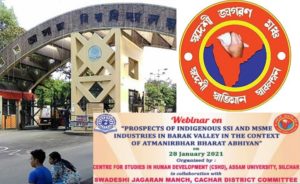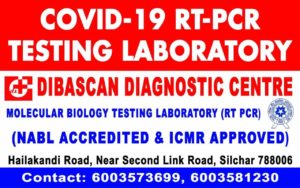Barak UpdatesHappeningsBreaking News
Aim should be to become job provider & not job seeker, says AS Panigrahi in Atmanirbhar Bharat webinar
Assam Univ & Swadeshi Jagaran Manch organises webinar on 'Atmanirbhar Bharat'

Jan. 28: Centre for Studies in Human Development (CSHD) of Assam University, Silchar in collaboration with Cachar District Committee of Swadeshi Jagaran Manch organised a webinar on 28 January, 2021. The topic of the webinar was “Prospects of Indigenous SSI and MSME Industries in Barak Valley in the Context of Atmanirbhar Bharat Abhiyan.”
The inaugural programme of the webinar began at 10.30 AM on 28 January with the welcome address by Prof. Niranjan Roy, Coordinator of the Webinar. This was followed by a speech of Prof. G.Ram, Director of Centre for Studies in Human Development (CSHD) of Assam University. Prof. Dilip Chandra Nath, Vice Chancellor of the varsity delivered the inaugural address. This was followed by the address of the Chief Guest Annada Shanker Panigrahi of Swadeshi Jagaran Manch. Prof. Gopalji Mishra deivered the Presidential address, whereas Santanu Sutradhar, President of Cachar District Committee of Swadeshi Jagaran Manch delivered the vote of thanks. The moderator of the webinar was Sudarshan Gupta.
 Expressing his views, VC Dilip Chandra Nath stressed upon the need to develop skills among the youths. He also said that the need of the hour is to empower the youths. He said, “Policies must be developed keeping in mind those living at the Panchayat level. Prof. Gopalji Mishra in his speech emphasised upon the fact that ways and means should be developed to check the wastage of resources. He said, “The need of the hour is nature friendly production.”
Expressing his views, VC Dilip Chandra Nath stressed upon the need to develop skills among the youths. He also said that the need of the hour is to empower the youths. He said, “Policies must be developed keeping in mind those living at the Panchayat level. Prof. Gopalji Mishra in his speech emphasised upon the fact that ways and means should be developed to check the wastage of resources. He said, “The need of the hour is nature friendly production.”
The chief guest of the occasion, Annada Shanker Panigrahi highlighted the fact that small industries, MSME and cottage industries in Barak Valley are lying in a deplorable condition. He said, “The industrial growth rate of Barak Valley stands at minus 9 percent. The reason for this poor growth rate is that people here are job seekers and job providers. To do away with this mentality, changes need to be done both at academic and societal levels. There shall have to be compulsory norms for procurement of certain percentage of goods produced by the small and cottage industries. There will be no use of local production, if the factor of local procurement is absent.
 The Technical Session started at 11.15 AM, which was chaired by Prof. N.B. Dey, former Dean, MGSEC, Assam University. Prof. Niranjan Roy was the lead speaker of this session. This was followed by an address by Prafulla Kumar Saikia, former Additional Director of Industries and Commerce, Govt of Assam. Dr. Suchitra Das of Karimganj College and Dr. Golap Ch. Nandi also presented their papers.
The Technical Session started at 11.15 AM, which was chaired by Prof. N.B. Dey, former Dean, MGSEC, Assam University. Prof. Niranjan Roy was the lead speaker of this session. This was followed by an address by Prafulla Kumar Saikia, former Additional Director of Industries and Commerce, Govt of Assam. Dr. Suchitra Das of Karimganj College and Dr. Golap Ch. Nandi also presented their papers.
 Dwelling on the issue of Atmanirbhar Bharat Abhiyan, Prof. Niranjan Roy said that at present, the government has been trying its level best to improve the connectivity of Barak Valley with the rest of the country. He made special mention of the water route from Barak Valley through Bangladesh. Once the issue of connectivity gets completed, this valley will have immense opportunity in the trading sector. He said, “From Look East, we have now moved on to Act East, which in itself is a sign of real progress. Barak Valley has the potential to become a hub of industrial activities, once the issues related to connectivity are sorted out.” He also spoke about the 5 pillars of becoming Atmanirbhar, which are economy, infrastructure, governance, demography and demand.
Dwelling on the issue of Atmanirbhar Bharat Abhiyan, Prof. Niranjan Roy said that at present, the government has been trying its level best to improve the connectivity of Barak Valley with the rest of the country. He made special mention of the water route from Barak Valley through Bangladesh. Once the issue of connectivity gets completed, this valley will have immense opportunity in the trading sector. He said, “From Look East, we have now moved on to Act East, which in itself is a sign of real progress. Barak Valley has the potential to become a hub of industrial activities, once the issues related to connectivity are sorted out.” He also spoke about the 5 pillars of becoming Atmanirbhar, which are economy, infrastructure, governance, demography and demand.
Citing examples of PPE kit and ventilators, Prof. Roy said, “After the sudden outbreak of COVID-19, India used to import these items from China and other countries, but thereafter India became self reliant in these items. At present, we export PPE kit and ventilators.” He stressed upon the fact that the small industries, MSME & cottage industries ought to ensure good quality of their products and increase their efficiency so that the commodities can become marketable.
 Prafulla Kr Saikia mentioned about transportation of horticulture related perishable items through air from Barak Valley, which will be a great boon for the producers. He further said that the need of the hour is to set up more and more cold storage facilities in this part of the region so that the agri-produce could be safely stored. Dr. Suchitra Das from Karimganj College in her presentation attempted to locate women in SSE, MSME. She said that most indegenous products are infact associated with women, like weaving etc. However, there is a very slow and sometimes negative growth in this field. The need of the hour, said Dr. Das to create a market for all such local produce.
Prafulla Kr Saikia mentioned about transportation of horticulture related perishable items through air from Barak Valley, which will be a great boon for the producers. He further said that the need of the hour is to set up more and more cold storage facilities in this part of the region so that the agri-produce could be safely stored. Dr. Suchitra Das from Karimganj College in her presentation attempted to locate women in SSE, MSME. She said that most indegenous products are infact associated with women, like weaving etc. However, there is a very slow and sometimes negative growth in this field. The need of the hour, said Dr. Das to create a market for all such local produce.
Dr. Golap Ch. Nandi of SS College, Hailakandi then presented a paper on Bamboo industry in Barak Valley. He said that products made from bamboo, such as, sheetal pati or bamboo shoot which can also be converted to jam and jelly has immense prospect of doing good business. However, the need of the hour is to do some good packaging and evolve proper marketing strategy.
 Finally, the Brain Storming session began at 12.45 PM which was be chaired by Prof. G. Ram. The lead speakers were Dr. Debotosh Chakraborty and Santanu Sutradhar. This will be followed by an address by Dr. Abhijit Kr. Mondal of NATRIP, Cachar. Citing his real life experience, Santanu Sutradhar highlighted a very pertinent aspect. He said, “The cane and bamboo products manufactured in Barak Valley are not consumed in India. So we have to sell them in Indonesia, Vietnam and Myanmar overcoming tough competition. Necessity of local markets is sina qua non for survival of small industries. We also need a raw materials bank over here. We further require a special Barak Valley based policy and an extension of Indigenous Institution of Entrepreneurship should be started in the valley.”
Finally, the Brain Storming session began at 12.45 PM which was be chaired by Prof. G. Ram. The lead speakers were Dr. Debotosh Chakraborty and Santanu Sutradhar. This will be followed by an address by Dr. Abhijit Kr. Mondal of NATRIP, Cachar. Citing his real life experience, Santanu Sutradhar highlighted a very pertinent aspect. He said, “The cane and bamboo products manufactured in Barak Valley are not consumed in India. So we have to sell them in Indonesia, Vietnam and Myanmar overcoming tough competition. Necessity of local markets is sina qua non for survival of small industries. We also need a raw materials bank over here. We further require a special Barak Valley based policy and an extension of Indigenous Institution of Entrepreneurship should be started in the valley.”
Dr. Debotosh Chakraborty spoke on the uneven development in Assam. Due to the huge burden of population, Barak Valley is facing great hindrances on the path of development. We are not having any synchronisation between the industries & institutions, so young boys and girls goes out of this region even for persuing a simple graduation course. He added, “The need is a imparting proper skills to the youths and empowering them with entrepreneurial training. For this, a comprehensive planning is required.”
Finally, there was an open session, which was followed by summing up of the webinar by Sudarshan Gupta. Manish Kumar Kamat then delivered the vote of thanks. Dr. Dipankar Roy and Dr. Biswabijoy Bhattacharjee were the rapporteurs of the session.



